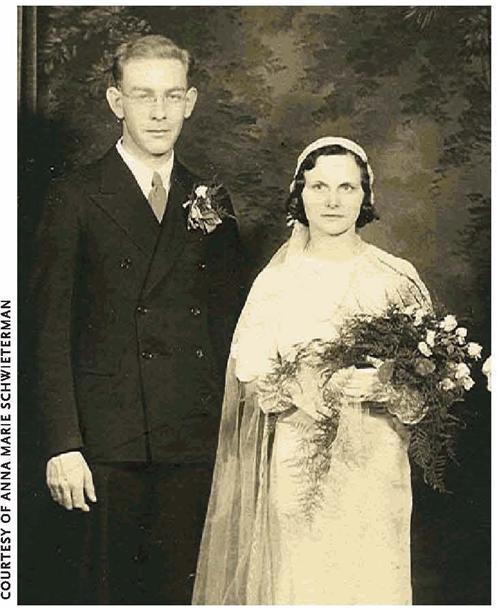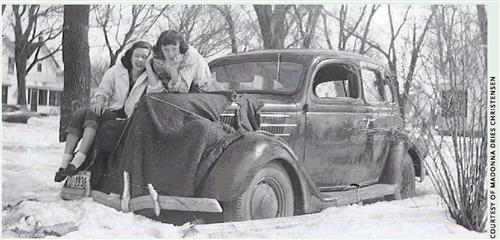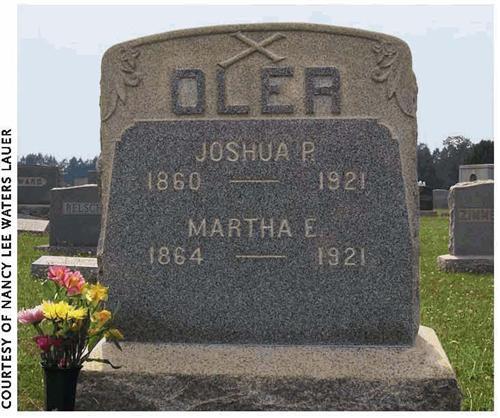Sign up for the Family Tree Newsletter Plus, you’ll receive our 10 Essential Genealogy Research Forms PDF as a special thank you!
Get Your Free Genealogy Forms
"*" indicates required fields
Old Flame
In September 2004, my husband and I traveled to the place in northern Indiana where my father met and courted my mother. I wanted to see and walk the grounds where they lived and worked.
As a 17-year-old in 1929, my mother left the family farm to work at Kneipp Springs Sanitarium in Rome City, Ind. It was the Great Depression, and what was to be a winter job stretched into 4½ years. My father came from Ohio to find work, too. The sanitarium grounds had mineral springs, now dried up. The building had its own power plant, dairy farm, chicken coop and wheat, corn and vegetable fields. Today the complex is a bed-and-breakfast, event hall and soccer camp.
Walking around the grounds, we met a volunteer who took us on a short tour and told us about past owners. She mentioned a retired farm manager, Gerhard Krull, who’d visit from time to time. He lived just down the road, and we paid him a visit. We spent time with him looking over photos and memorabilia, and listening to stories of his days working at the sanitarium. Can you imagine my surprise when I discovered this 95-year-old man had dated my mother?
Star Struck
“Train Stalled, Roads Plugged As Fourth Storm Strikes NW Iowa During Weekend” was the headline in the March 22, 1951, Sibley Gazette-Tribune. But by the time the paper came out, everyone already knew there was more to the story than a stalled train. My family got the scoop from my mother, a cook at the Palace Cafeé the night it happened.
Ma plodded into the house later than usual. She shucked off her coat, headscarf and gloves and warmed her hands over the oil heater.“There’s a train stalled at the depot,” she said. “Someone famous was on the train, and I cooked supper for him. Guess who it was.”
To my sister and me, famous meant movie stars; to my brothers it meant sports figures. We tossed out names until Ma finally told us it was Henry Fonda. While we gaped, my father scoffed. He often told Shirley and me, when we spent our baby-sitting money on movie magazines, that actors and actresses weren’t respectable and shouldn’t be idolized. Listening now the commotion, he said, “Pipe down. I’m sitting next to the radio and I can’t heat my program.”
Ma motioned us to the parlor, where she explained the cast of a play called Mr. Roberts had been on the train. They’d eaten at the cafe and gone to the hotel for the night.“Henry Fonda was the only famous one.” she said,“but you should’ve heard people, saying this one or that one was so-and-so.”
“Did you get his autograph?” Shirley asked her.
“Gosh, I didn’t think of that. Anyway, we were too busy. I did carry out the food for his booth, while the waitress was busy. When I put down his plate, I touched his hand, accidentally.” She smiled as she held out her hand.“Any one want to touch the hand that touched Henry Fonda?” Shirley and I did; the boys thought we were silly.
“He’s real handsome,” Ma continued. “And nice. He acted like he was nobody, visiting with folks. Lavonne Woodward from the paper came in and interviewed him.”
In school the next day, dozens of kids whom I knew weren’t downtown on a school night claimed they’d seen Henry Fonda. Or Loretta Young, Dana Andrews, Clark Gable, Bette Davis, Gary Cooper or Jimmy Stewart. To hear them talk, a cast of hundreds left their footprints on our snowy streets, making us the Midwestern equivalent of Grauman’s Chinese. Theater. I said nothing, certain that I, through my mother, had come closer to a movie star than any of them.
In time, Fonda’s visit became yesterdays’ news, except at our house. Ma had ways of reminding us she’d cooked for a Hollywood prince. If we complained about having to eat hamburger again, she’d say,“My hamburgers and fries were good enough for Henry Fonda, and they’re good enough for you.”
Just Ask
My great-grandmother Martha“Mattie” Smith is no stranger. I have her Bible and regularly put flowers on her grave. Unfortunately, she neglected to record her parents in her Bible, and her son listed them I as unknown on her death certificate. Now there’s no one left who knew her.
For years I checked every conceivable record and name variation, and always came up empty. One day, while visiting the cemetery, I said,“Mattie, you have to help Give me a sign, and I’ll do the rest.”
The next day I learned the 1880 census was online. I typed in Mattie’s name. She was born in 1864, so I was looking for a 15- or 16-year-old. I found one Mattie Smith, age 15, living in Hampden, Baltimore, Md. My heart skipped a beat — Hampden is the neighborhood where my mother’s family lived in 1880.
Mattie was listed with her widowed mothel; Temperance Smith. Could this be her? Next, I perused nearby names and was shocked to discover next-door neighbors Martha (née Smith) Oler, widow, and her two daughters. I immediately recognized this family as the aunt of Joshua Oler, Mattie’s future husband.
I’ve since proven Temperance and Martha were sisters, and this Mattie is indeed my great-grandmother. Another brick wall broken, and my genealogical guardian angel found.
Hey, You in the Cradle …
I guess every family has someone who’s a character. Ours is Hallie Jones Wallace, my great-grandmother on my mom’s side. All her grandchildren and great-grandchildren can recall at least one story about Mamaw and double over in laughter. She loved to talk and didn’t mind telling an odd story, even to mock herself.
When Mamaw was born in 1904, her parents had two daughters and desper-ately wanted a boy. They were so sure God would bless them with a son, they never even considered what they’d name a girl. For two whole weeks my poor Mamaw didn’t have a name. Then a peddler came to the house and, hearing of this dilemma, named the baby Hallie for the prettiest girl he knew. I’ve always wondered what my great-great-grandparents called Mamaw the first two weeks of her life. Thank goodness the peddler came along.
A Winnie Attitude
Finding Winnie Hale, my grandmother’s older sister, was a goal of my recent genealogy trip to LaFayette, Ga. Winnie was on her school honor roll in 1896, and was 18 years old and living at home in the 1900 census, but she disappeared after that. I was frustrated.
The first day, I headed 7 miles south to the Chattooga Cemetery. Halfway there it started storming, so I turned around and executed Plan B: Go to the LaFayette library. I sat down and opened a 1904 obituary index — there was Winnie.
The obituary gave her married name and said she was buried at Chattooga, next to her mother. When I returned to the cemetery, the grave next to Elinor Hale’s belonged to a W.Z. Maffette. If it hadn’t rained, and I’d gone to the cemetery first, I’d never have known that was Winnie’s resting place.
From the April 2006 issue of Family Tree Magazine.
ADVERTISEMENT







